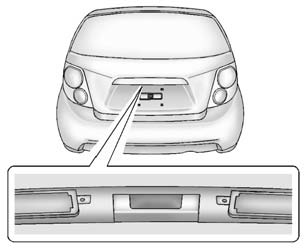Chevrolet Sonic Owner's Manual: Liftgate (Hatchback)
Warning
Exhaust gases can enter the vehicle if it is driven with the liftgate, hatch/trunk open, or with any objects that pass through the seal between the body and the hatch/trunk or liftgate. Engine exhaust contains carbon monoxide (CO) which cannot be seen or smelled. It can cause unconsciousness and even death.
If the vehicle must be driven with the liftgate or hatch/trunk open:
- . Close all of the windows.
- . Fully open the air outlets on or under the instrument panel.
- . Adjust the climate control system to a setting that brings in only outside air and set the fan speed to the highest setting. See ŌĆ£Climate Control SystemsŌĆØ in the Index.
- . If the vehicle is equipped with a power liftgate, disable the power liftgate function.
For more information about carbon monoxide, see Engine Exhaust.
To lock or unlock the liftgate from the inside, press
 or
or
 on the central locking switch or on
on the central locking switch or on
the driver door.
The vehicle must be in P (Park) for automatic transmissions. For manual transmissions the parking brake must be engaged.

To open the liftgate from the outside, press
 on the RKE transmitter to unlock all
on the RKE transmitter to unlock all
doors, then use the touch pad.
See Remote Keyless Entry (RKE) System Operation.
When closing the liftgate, close from the center to ensure that it fully latches.
 Emergency Trunk Release Handle
Emergency Trunk Release Handle
Caution
Do not use the emergency trunk release handle as a tie-down or anchor point
when securing items in the trunk as it could damage the handle.
There is a glow-in-the-dark emergency trunk re ...
 Vehicle Security
Vehicle Security
This vehicle has theft-deterrent features; however, they do not make the vehicle
impossible to steal. ...
Other materials:
Windshield Upper Reveal Molding Replacement
Windshield Upper Reveal Molding Replacement
Callout
Component Name
Preliminary Procedures
Remove the windshield to replace the reveal molding. Refer to Windshield
Replacement.
1
Windshield Revea ...
Parking Brake Adjustment (Disc Brake)
Note: The park brake cable adjusting nut is a nylon lock type. Use
ONLY HAND TOOLS whenever tightening or loosening the adjusting nut.
Apply and fully release the park brake several times. Verify that the park
brake lever releases completely.
Turn ON the ignition. Verify the red B ...
Strut, Strut Component, or Spring Replacement
Disassembly Procedure
Remove the strut assembly from the vehicle. Refer to Strut Assembly
Removal and Installation.
Note: The spring is compressed when the strut moves freely.
Install the strut assembly (2) in a suitable spring compressor ...
0.0059
